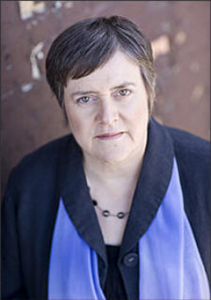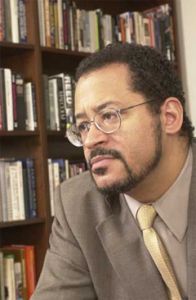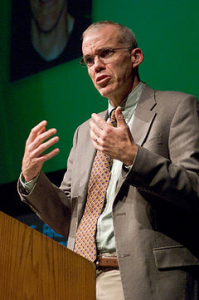We just finished an amazing week of thinking and discussing the role of writing, especially its prophetic role in our culture. Our annual Writer’s Symposium By The Sea (can you believe we’ve been doing this for 15 years? Joe Wambaugh got us started!) was part of a larger conference on our campus — it was a riff off of Walter Brueggemann’s book, The Prophetic Imagination. We called our event “Nurturing The Prophetic Imagination.” We started with Kathleen Norris, who talked about seeing beauty in all things. My interview with her, discussing her career, her

new book Acedia and Me, and the craft of writing, will be on my site in the next few weeks. She really is a remarkable person. Who else can talk about prairies, monasticism and apathy, and make it compelling reading? Somehow she does. Her book The Cloister Walk is one of the most profound books I’ve read. Acedia and Me is close behind.

The next day we had this hurricane blow through campus, by the name of Michael Eric Dyson. I knew after reading the first few pages of his book Open Mike that I was going to like this guy. I had no idea that I was going to be in such awe of him. I prepared for this interview with great care. This guy knows all things about race, hip-hop music, black celebrities, and seems to take no prisoners. Interviewing him was like trying to interview Robin Williams. He was hilarious, serious, profound, deep, all while channeling Martin Luther King Jr., Snoop Dog, Tupac, Bill Cosby and Oprah. What was going to be a 30-minute interview quickly became an hour-long exchange. He was dripping with sweat when he was done. I was exhausted. So was the audience that still had enough energy to give him an instant standing ovation when he was done.
Bill McKibben, the environmental writer and activist, came the next day and told us about the efforts to treat the planet as if

it were part of God’s creation, instead of a sewer. I had never heard anyone talk about the book of Job in the Old Testament as an environmental book before, but it made sense. McKibben used to write the Talk of the Town column for the New Yorker, and then began writing about the environment. The first book of his that I read was The Age of Missing Information, where he recorded 24 hours of television on the 100 cable channels in his town, and he watched every single program. That’s right, he watched 2,400 hours of TV. Then he spent 24 hours at the top of a mountain in the Adirondacks. What did he learn from each? Part of the lesson of watching a lot of TV is that the constant message is that you are the center of the universe, and you should have whatever you want, regardless of the cost or the damage it causes. Part of the lesson of being on a mountain is that you are part of something much larger. You’re not the center of the universe. You’re part of it — and it’s a complex, beautiful world you get to participate in. I believe Galileo and Copernicus came to similar conclusions by studying the planets. Interestingly, McKibben is dismissed by critics as a crank. Galileo and Copernicus were viewed as heretics. That’s a little progress, over several centuries, I guess. I re-read McKibben’s book on Job in the redwoods last week where I was speaking at a writers conference. The Comforting Whirlwind is a great read anywhere, but it’s especially good outside among trees that have been around for 2,000 years.
Maybe one of the most beautiful moments of the week came out of the question and answer period with the audience after my interview with Dyson. The last question was from an African-American student who said that her father read Dyson’s book on hip-hop, “Know What I Mean?” in prison and loved it. He was going to be in prison another six years, and she wanted a recommendation of another Dyson book to give him. Dyson told her that his book “Between God and Gangsta Rap” would be a good one, because it includes a letter from Dyson to his own brother Everette, who is also in prison. Dyson seemed moved that the young lady wanted her father to keep reading Dyson. I told her that the book was for sale in the lobby, and that Dyson would sign it. Then one of our graduate students, Richie Rogers, stood up from his seat toward the front, walked over to her and gave her his copy of “Between God and Gangsta Rap.”
Every heart in that auditorium was buoyed by that selfless act.
Prophets are good at challenging conventional wisdom, of holding authorities accountable, and providing light into the dark future. That’s what Norris, Dyson and McKibben did. But that act by Richie made us glad we were alive to see it. He put a spotlight on that moment, and we all declared it good.